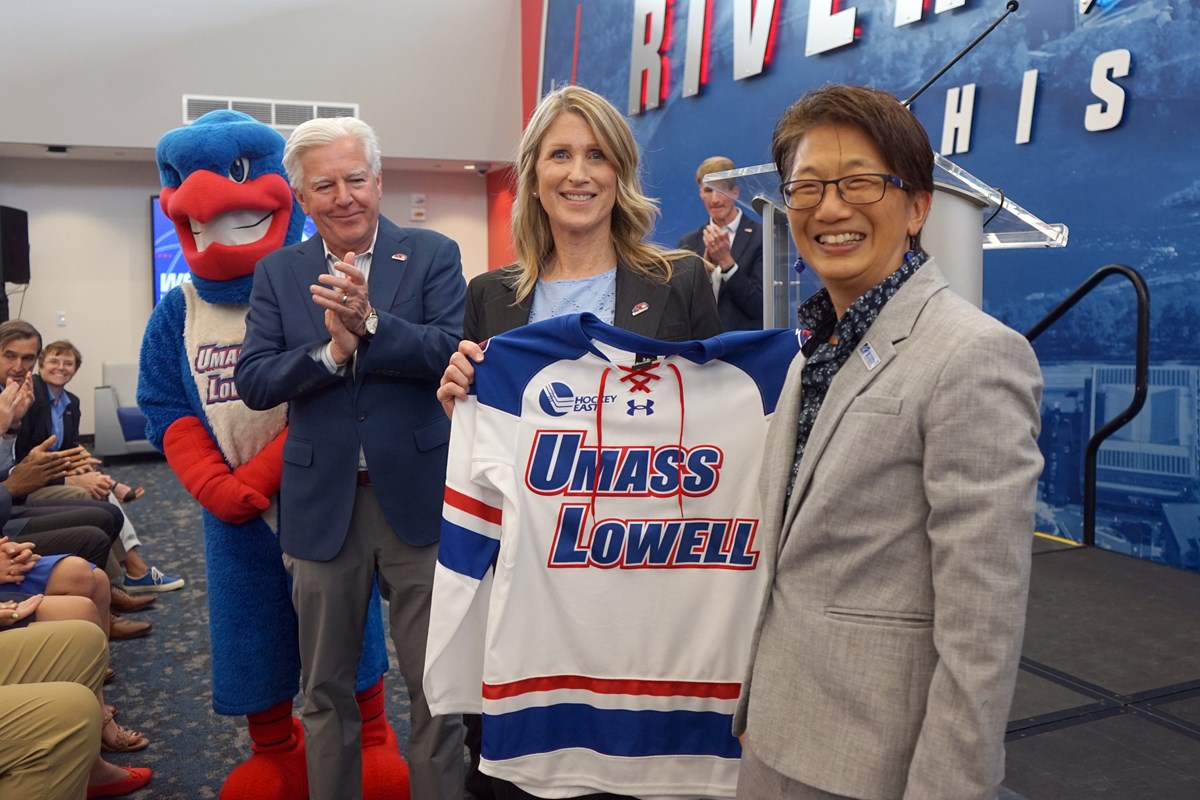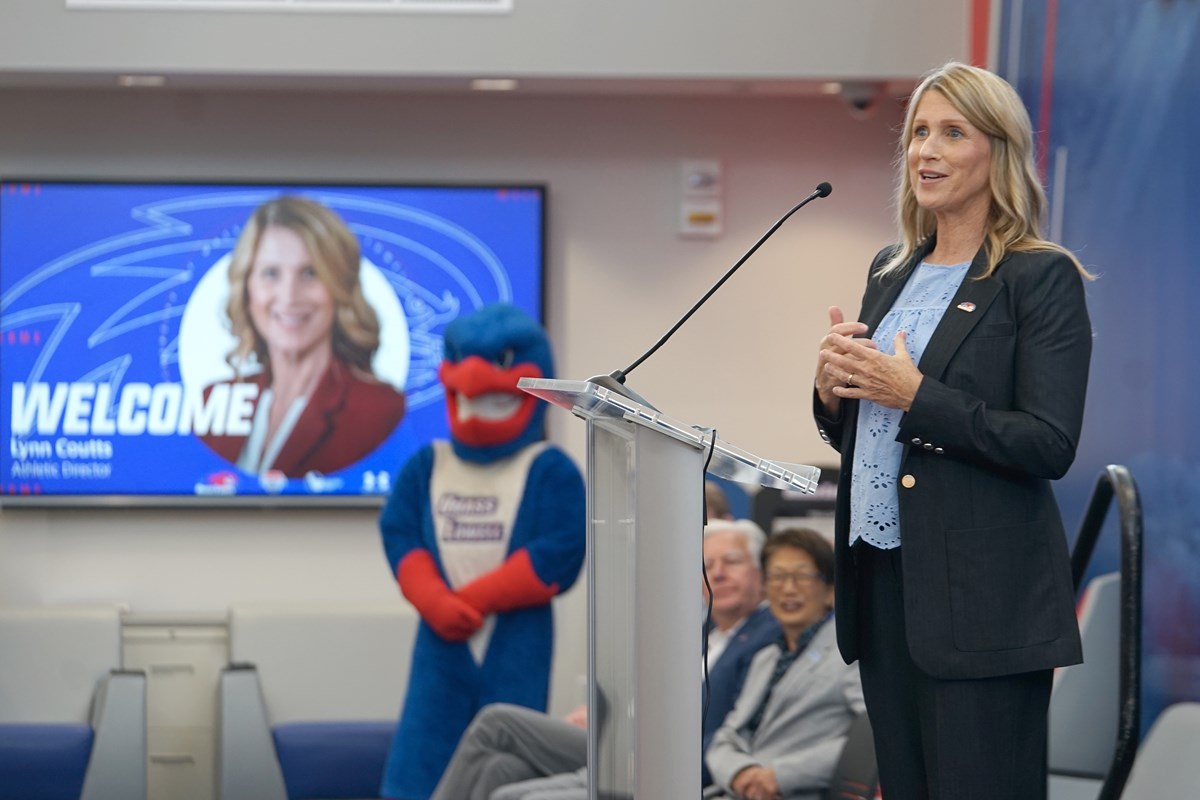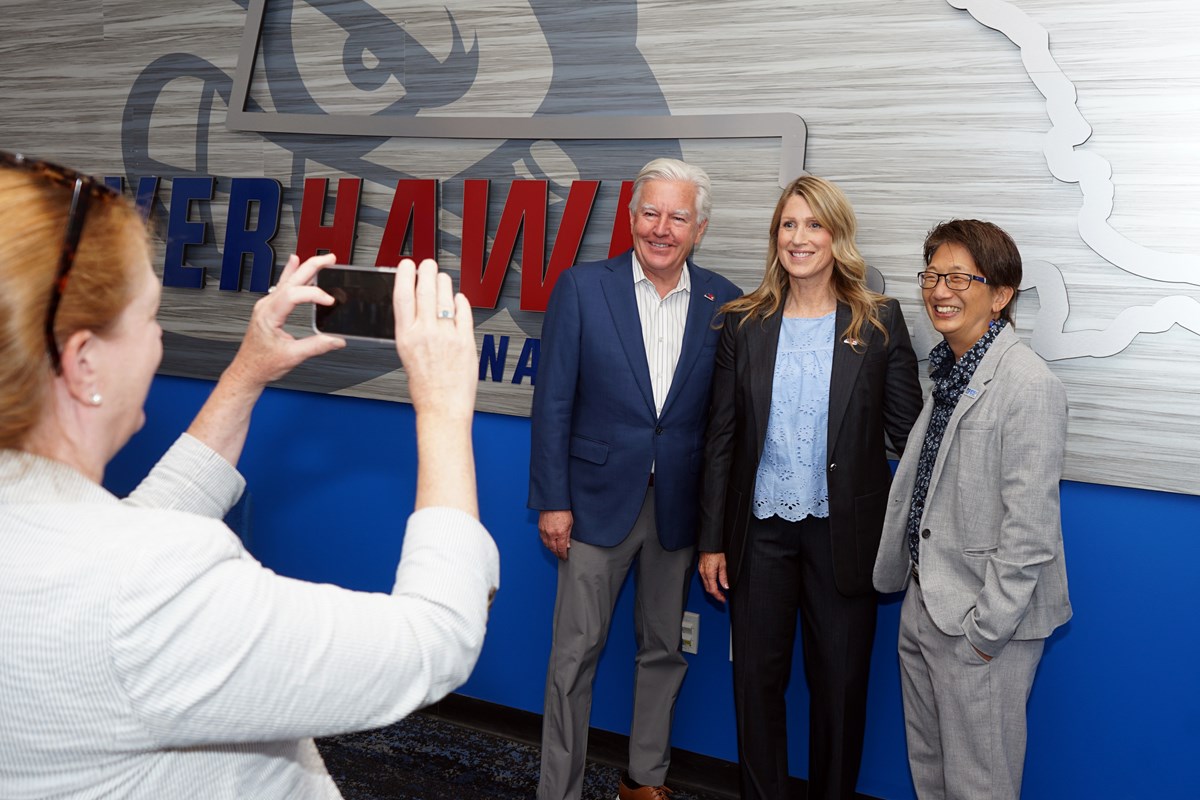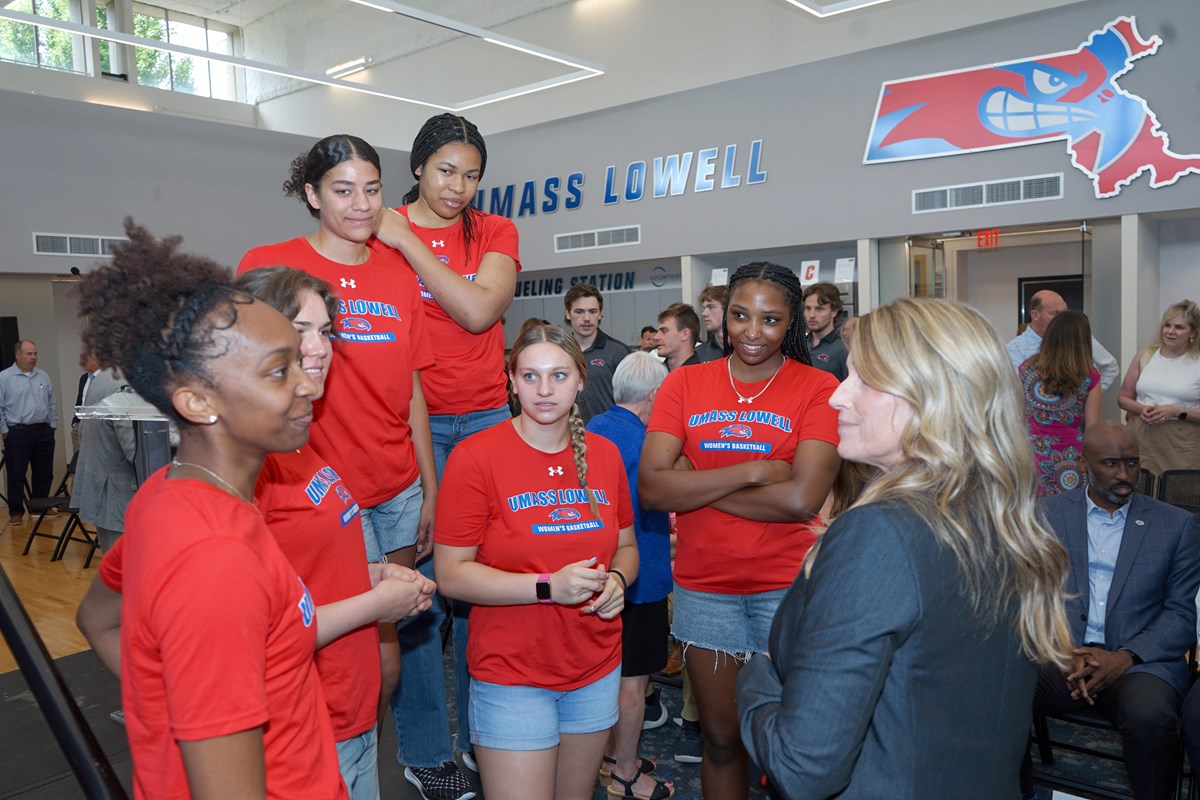 Image by Ed Brennen
Image by Ed Brennen
New Athletic Director Lynn Coutts, right, high-fives Sydney Watkins, a senior guard on the UMass Lowell women's basketball team, during her formal introduction in July at Costello Athletic Center.
Athletics are often described as the “front porch” of a university — the most visible entry point into an institution.
UMass Lowell’s new director of athletics, Lynn Coutts, takes the analogy a step further. She sees athletics as a wraparound porch.
“Sometimes we get in our own silos, where every department is focused on what they’re trying to do,” Coutts says. “So a wraparound, to me, is just making sure you have touchpoints all over campus. You have to be able to see all the different areas, and how every decision that we make impacts something else.”
Coutts was formally introduced in July as UML’s first female athletic director, bringing more than two decades of experience as a collegiate coach and administrator. She previously served as associate vice chancellor, deputy director of athletics and senior woman administrator at the University of Denver.
 Image by Ed Brennen
Image by Ed Brennen
Lynn Coutts receives a UML hockey sweater at her formal introduction, where she was joined by, from right, Chancellor Julie Chen, UMass President Marty Meehan and Rowdy.
“I’m not big on titles, but I am grateful for this position and excited for the opportunity. I think life in general has prepared me to be an AD,” says Coutts, a native of Rochester, New York, who moved with her family to Quebec, Canada, when she was 9. Before her junior year of high school, she moved on her own to Washington, D.C., to live with her uncle and mentor, the late Bryan Murray, who at the time was general manager of the NHL’s Washington Capitals.
“I’ve never been afraid to take risks,” Coutts says.
At the University of Maine, she became a Northeast All-American softball pitcher and two-year captain. After running a sports training business with her husband, Mike, for nearly 14 years, she was head softball coach at her alma mater from 2011 to 2015 — earning America East Coach of the Year honors in 2015 — before becoming an administrator there.
Coutts sat down in her new office at Costello Athletic Center to talk about her goals for River Hawk Nation.
Q. What drew you to the position here?
A. Denver's not a place you want to leave — it's a beautiful place and an outstanding institution — but there’s a certain time in your career when you think, “What do you want as the next step?” What I found here in talking to Chancellor (Julie) Chen and learning about her vision, her energy and her enthusiasm, is that I need to be part of this team. She is a former student-athlete as well, so she understands the value of athletics. To me, if you don't have the support from campus leadership, it's an uphill climb. She understands that bringing accomplished and talented student-athletes to UMass Lowell is important for the vibrancy of the university. Another reason is that I like a challenge. There was an opportunity here to say, “OK, let's see what we can do.” I think people here are very hungry. I also wanted to come back east to be close to family and friends.
 Image by Ed Brennen
Image by Ed Brennen
"There's a lot of pressure on student-athletes, on young people, so we have an obligation as educators," says UML Athletic Director Lynn Coutts. "How do we prepare them for life after college? That's really what we're here for."
A. I’ve been meeting as many people as I can across campus and getting a lay of the land. I don't use my GPS to get around campus anymore, so I feel like I've accomplished something. I’m sitting down with coaches and hearing about each program — that was my first priority — and then taking a step back. It's been a very inspiring first couple of weeks. There’s a lot of great energy here. People are excited to go to the next level. I’m learning about the city of Lowell, too. Everybody knows everybody here, and they're very proud of that.
Q. You are the first athletic director at UML to be included on the university’s executive cabinet. Why is that important?
A. That connection is helpful because I can share information with folks in the Athletic Department. It's important to know that you're part of a bigger picture. We focus so much on wins and losses, but there are so many ways to help lead to those wins. Folks are rooting for these student-athletes and they want to help elevate them, and I need to bring that information over. I'm grateful to be in a room with these incredible people who run the university.
 Image by Ed Brennen
Image by Ed Brennen
Athletic Director Lynn Coutts poses for a photo with UMass President Marty Meehan and Chancellor Julie Chen at Costello Athletic Center.
A. Obviously, the experience for today’s student-athletes is a lot different than when I played. I really enjoyed the leadership piece; I feel like I was a coach while I was playing. As a pitcher, you always have something to think about. You're reading the hitter. You're talking to your defense. And how I responded to an error was really important. I had to make sure that I said, “OK, let’s get the next one.” That's how you have to lead. You have to be consistent. People have to know how I'm going to show up every day. I think that comes from being a student-athlete. You have to try to balance and juggle a lot of different things. It teaches you about resilience and grit and having a growth mindset.
Q. You were part of two NCAA men’s hockey national championships and a Final Four appearance by the women’s lacrosse team at Denver in the past three years. What kind of impact did that success have on the university?
A. There's no question that it helps with enrollment. Studies show that winning teams draw students; they want to be part of that. Even if you don’t love the sport, athletics are an opportunity to bring the community together. We want to try to do more for students on campus here. How do we bring them in? We've got very smart young people here who are intense in their studies. How do we provide some free time to enjoy with their friends? And how do we get faculty and staff to come, too? We want them to take interest in some of the things students do outside the classroom.
 Image by Ed Brennen
Image by Ed Brennen
Lynn Coutts chats with members of the UML women's basketball team during her introduction as athletic director.
Q. What do you want alumni to know about you?
A. Alumni are our foundation, so I'm hoping that we can reach out and people will be excited to see where we're going. If you talk to our coaches who have been here a while — Gary Gardner with track and field, Norm Bazin with hockey, Shannon LeBlanc with field hockey — their alumni base is huge, and they’ve been great supporters. But is there a good bridge to the people who were here before we transitioned from Division II to Division I? I don’t know yet. We’re going to dig into that piece of it. I’m working with the Office of University Advancement right now, trying to come up with plans on how we do that. We want alumni to know that we appreciate everything they've done to build where we are today.
Q. This summer, Mill City Collective was named UML’s official name, image and likeness (NIL) donor-based collective, designed to facilitate NIL partnerships between student-athletes and charities, nonprofits, business owners and the local community. What are your thoughts on NIL and other recent changes to college athletics, such as the transfer portal?
A. NIL is just part of the game. It's clear that people are not going to be able to keep up with the big schools that are giving hundreds of thousands and millions of dollars, but NIL will help with bringing certain kids here, for sure. NIL is part of the strategy, just like the transfer portal. If someone wants to leave after two years to get more NIL dollars somewhere else, how are you going to tell them no? But I know we can provide a great experience, and our student-athletes can be fulfilled. The House settlement [a proposed settlement of a class-action lawsuit against the NCAA that would for the first time establish a framework allowing schools to pay Division I college athletes directly] is going to be a whole other deal. There’s a lot of speculation, but nobody knows what’s going to happen. We will wait and figure that piece out. The NCAA is going to continue to change, but I know things are in place here at UMass Lowell to grow with those changes.
